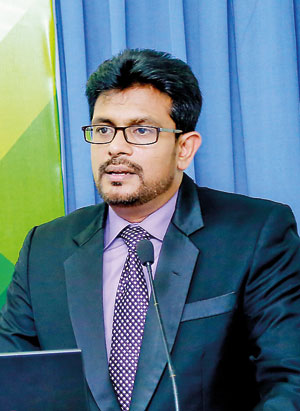Is Sri Lanka the market for selling unrecognised University qualifications?
View(s):
Janagan Vinayagamoorthy Ceo / Md – Idm Nations Campus
Janagan Vinayagamoorthy, the CEO / MD, IDM Nations Campus recently made a strong comment “This current Sri Lankan government has taken steps to bring down various private foreign universities. Even though we are welcoming the idea, the biggest drawback in Sri Lankan Higher Education Industry (either Private or Semi-Government) is that the Degrees or the Higher diplomas offered by these institutes which are affiliated with the international universities or examination body is not properly evaluated or there is no proper mechanism incorporated to evaluate the qualifications by the Sri Lankan education system”
“Out of 337,704 candidates, who sat the G.C.E A/L Examination 2019, only 53% have been qualified for university entrance and among them only 20% were admitted to State universities due to limited placements in the state funded universities. Around 150,000+ students are obliged to go for private university education.”
Higher Education industry in Sri Lanka regardless of Private higher education institutions or Semi-Government higher education institutions;is too much dependent on Importing Education for the past few decades and has caused problems which lead to alarming concerns. This dependency leads to two main problems.
Establishment of a Higher Education Institution
Standard / Quality of the Programme delivery
ESTABLISHMENT OF A HIGHER EDUCATION INSTITUTION
In Sri Lanka there is no measurable restriction for establishing a Higher Education Institute. Anyone could start an education institution overnight. Higher Education Institutions (private) in Sri Lanka appears to have moved on without the guidance of a holistic and coherently enunciated long term educational policy for the last few decades.
When considering the Education System in the Western Countries or Malaysian or Euro-African countries or even the Maldives, it is a substantial requirement of each Institute to possess the licence with all the proper Educational facilities and infrastructure to initiate before commencing the student recruitment procedure. However in Sri Lanka, the practice is just the opposite of what happens in the other nations mentioned above. Without any incorporation / proper facilities made within, the institute can recruit the students and start delivering the programmes and in turn / sequentially it is capable of applying for the recognition (TVEC) or Higher Education Ministry.
Same mishap occurs while shutting down an education institution; as there is no proper Exit strategy / Policy in place to close down an institute. Without any prior notice, the authorities of the institute can terminate the institute overnight and start another institute with a different name the very next day. This arises the concerns of social issues as the students who have invested their money, time and attended the lectures / classes are now stranded without obtaining any qualification for their effort, hard work and this in turn psychologically devastates their dreams.
“Many Investors / Businessmen misuse this unregulated mechanism and use education industry as a money making source with corporate malpractices”
STANDARD / QUALITY OF THE
PROGRAMME DELIVERY
Many institutions of the Private sector / Semi-Government have not applied for registration/certification. They have avoided the process of paying fees and go through the process of getting approval as they make use of an affiliation to a foreign university to assert their presence in the market. A foreign university affiliated institution does not face legal barriers in offering degrees under the current regulatory environment.
The University Grants Commission (UGC) in terms of the provisions of the Public Administration Circular No. 16/92 dated 13March 1992 recognises universities listed in the International Handbook of Universities and the Commonwealth Universities Yearbook but not the degree programmes offered by other recognised foreign universities. With the growing number of affiliated institutes, the lack of policy on quality and a governing authority are issues that have been raised by many stakeholders in the society. There is no legal entity or regulatory body to monitor the functions of these foreign university programmes.
When offering UGC approved degrees, some questions that have arisen are:
a) whether the offered degree programmes are suitable for Sri Lanka
b) Whether the university which is offering degree programme is allowed or regulated to deliver its degree programmes outside the host country
c) Can we consider the programme is recognised if it is listed in the International Handbook of Universities.
There is no mechanism to find out the answers for the above questions.If this education system continues in this country, “There will be 100% successful completion of the qualification rather than 100% successful employment”. Sri Lanka faces a great challenge with the limited higher educated human capital which is unable to meet the demands of the market.
Furthermore, Janagan Vinayagamoorthy strongly believes that the establishment of these institutes needs to be regulated by ensuring that the parent institutions and courses are recognised in the country of origin as well as in Sri Lanka.Even for those Private / Semi-Government higher education institutions awarding foreign degrees there are issues with regards to the recognition of the degrees. There is no regulatory body relevant to the subject/discipline and does not evaluate the foreign degrees.
Janagan Vinayagamoorthy also said “Education Industry requires an overall independent accreditation board / Counsel for monitoring standards of foreign qualifications in Sri Lanka like SLMC and The Council of Legal Education.
This becomes all the more important because key stakeholders in a particular discipline can always work together to stymie outside competition and produce high standard / quality students to the job market.


